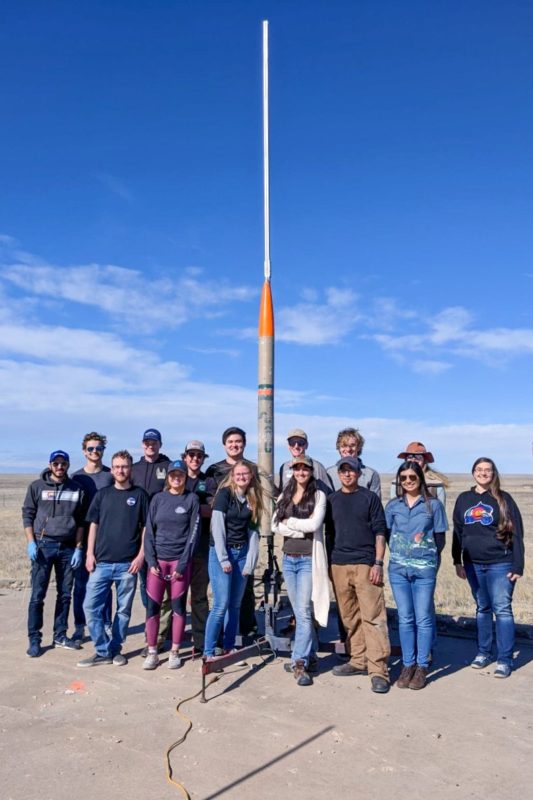NASA Space Grant Program
at CSU
The NASA Space Grant Program at CSU has a 30-year history of providing undergraduate students with educational and professional opportunities in aerospace studies through the Colorado Space Grant Consortium’s (COSGC) project-based team challenges and competitions.
Opportunities for students
We currently do not have any open positions for hire. They will be posted here when they become available. Please check back.
SUMMER 2021 INTERNSHIP
The CSU NASA Space Grant program will again hire undergraduate students for paid internships in summer 2021. The internships will provide stimulating and challenging opportunities to work on hands-on hardware projects. Applying students should have a strong interest in space-related research and solid academic background, as demonstrated from other research experiences and/or course work. The summer projects will be part of the statewide DemoSat-B program. We expect to have 2 teams of 3 students build a payload that will be launched to the edge of space on a weather balloon. Example payloads are for sensing atmospheric pollutants, deploying a landing rover, or capturing biological samples from the air. The program and launch are organized by the NASA Colorado Space Grant Consortium, see here.
The summer undergraduate internships are for an amount up to $4,900 for a full summer (10-week) student effort working at least 40 hours per week. A maximum of one week of “time off” will be allowed and a serious commitment is required. Each project team will also have a budget of $1,000. The duration of the intern position will be May 24th – July 30th. A kickoff telecon with be held in early May that interns will be required to participate in. The DemoSat-B launch is tentatively scheduled for Saturday July 24th and is to be worked as an unpaid day. The final week of the internship, July 26 -30, will be after the launch and will be spent on data analysis and writing the final report.
In all cases, applications should be submitted by individual students. Applications should include the following:
- Cover letter
- Resume (CV)
- Copy of CSU transcript (unofficial copy is fine)
- A project proposal
The cover letter should discuss related skills and experience, and interest in space research. The project proposal should be 2-3 pages in length and should present a project idea for the DemoSat-B project. The proposal is partly to gauge your ability to define a problem and approach, technical writing etc., and may ultimately not be the project you work on. A team of students can submit the same project proposal, and request to work together, though we cannot necessarily accommodate this with the final hiring.
Applications are due by Friday April 9, 2021 and should be emailed to: spacegrantcsu@gmail.com
Please also email any questions to: spacegrantcsu@gmail.com.
IMPORTANT NOTE: We are assuming that the CSU campus will be adequately open to allow for students to work together on the campus. However, this will not be definite for several more weeks, and we reserve the right to change these internships to remote (online) ones and/or to cancel them depending how the pandemic develops.
Past Projects
Depth Perception Buddy
2020. A wearable device to assist pedestrians with obstacle recognition and avoidance. People’s Choice Video winner at the 2020 COSGC Undergraduate Space Research Symposium. CSU Wearables Team: Diana Bilbao, Vanessa Montoya, and Melanie Blake.
High-Altitude Balloon VR Simulation
2020. A Unity 3D simulation of the flight trajectory of a DemoSat high-altitude balloon launch featuring virtual reality support and GPS-based terrain visualization. Huanjia Liu.
A Diabetic Retinopathy Model for the Automated Detection of Eye Disease in Astronaut Retinal Images
2020. Development and validation of a machine learning algorithm for the automated detection and classification of diabetic retinopathy from retinal images. Grand prize winner at the 2021 COSGC Undergraduate Space Research Symposium. Sydney Alderfer.
Evaluation of Shockwave Effects on Supersonic Nose Cone Geometries
2020. A model of the effects of rocket nose cone angle at supersonic speeds using computational fluid dynamics, including an investigation of the CSU Intercollegiate Rocket Engineering Competition (IREC) team’s Aries IV Rocket. Thomas Marshall and Rebecca Zulch.
NASA Lunabotics Rover
2020. Design and testing of an autonomous rover for harvesting water on the moon. Brooks Classick, Mason Deal, Jade Lee, Zach Scott, Jacob Sheradin and Rick Stansbury.
Aires IV Sounding Rocket
2019. A custom-built bi-propellant liquid rocket used to launch a muon detector to 30,000ft in order to map the magnetosphere for the Spaceport America Cup intercollegiate sounding rocket competition. CSU Rocket Team.
In The News
CSU students win big for NASA Space Grant anniversary
CSU mechanical engineering students received several honors at the 2020 Colorado Undergraduate Space Research Symposium earlier this spring — a testament to a 30-year commitment to space education and project-based learning.
Employees from NASA and industry giants Ball Aerospace and Lockheed Martin joined 160 students from Colorado Space Grant Consortium (COSGC) affiliate universities in a remote video conference to judge the students NASA-funded team challenge projects.
The panel of aerospace professionals recognized two teams of CSU students with best in-session presentation awards. Members of the public who attended put a third CSU team at the top of the people’s choice category.
CONTACT INFORMATION
Dr. Azer P. Yalin
Director, Center for Laser Sensing and Diagnostics
Professor, Department of Mechanical Engineering
Office: Engineering A103P
Phone: 970-491-2813
Email: azer.yalin@colostate.edu
Website: www.engr.colostate.edu/projects/clsd
IMPORTANT LINKS
Mechanical Engineering at Colorado State University is about using our knowledge of materials, energy, and health to solve society’s global engineering challenges.
Mechanical engineering at Colorado State University is about using our knowledge of materials, energy, and health to solve society’s global engineering challenges.
Join Us.
Programs and Information
Programs and Information
Faculty and Staff
Labs and Researchers
